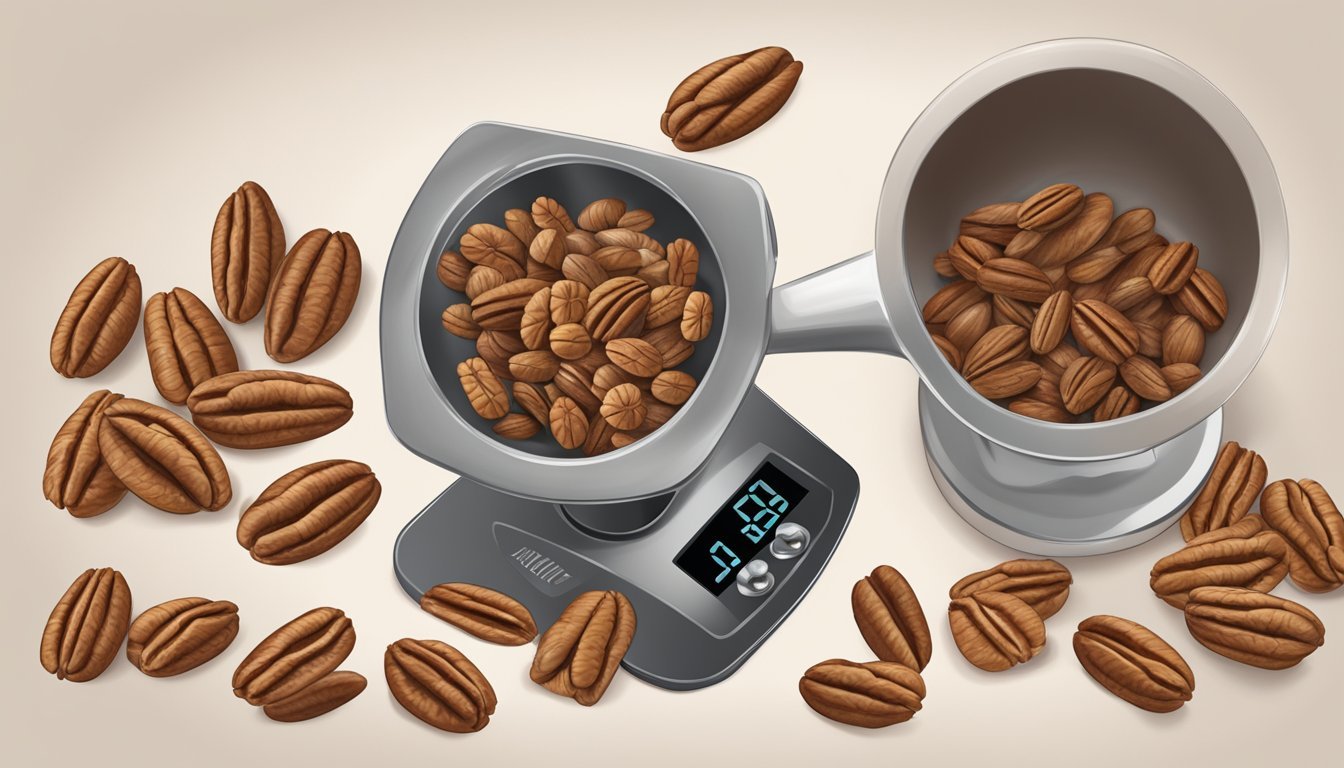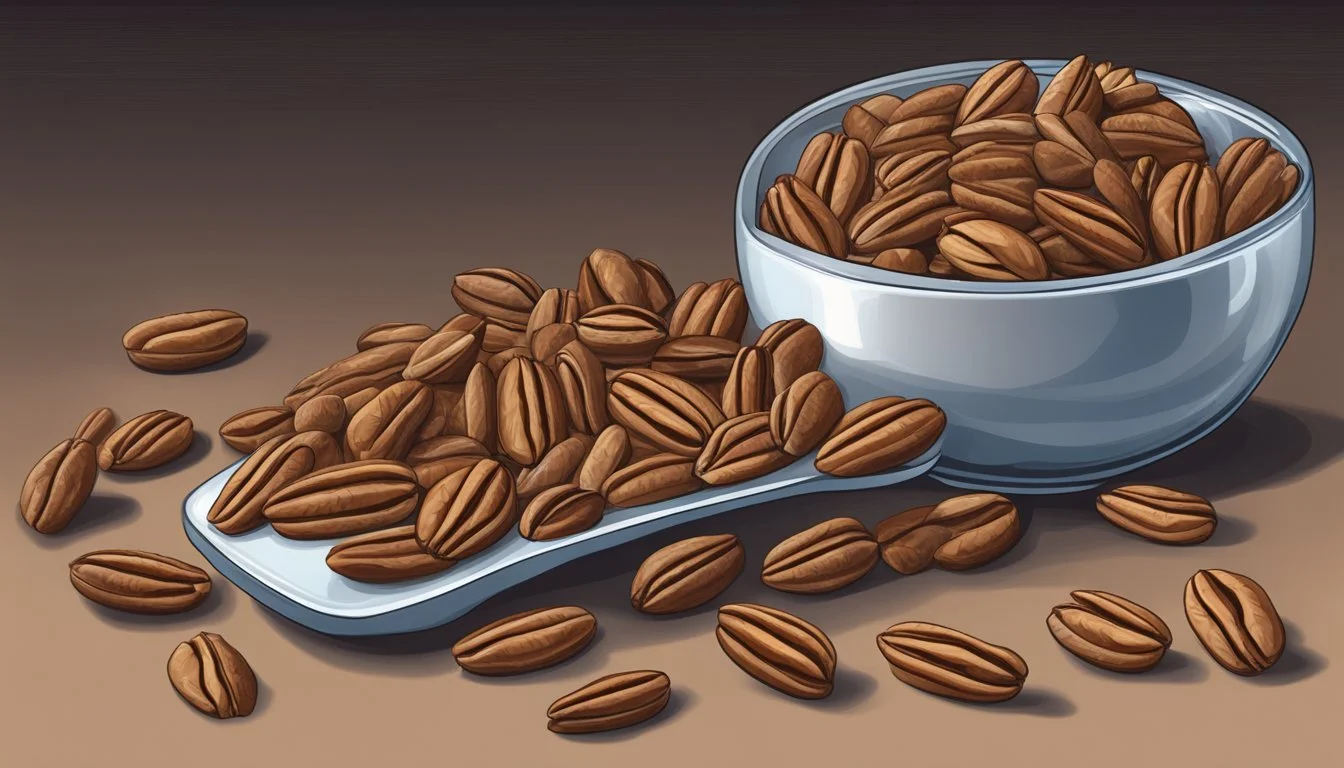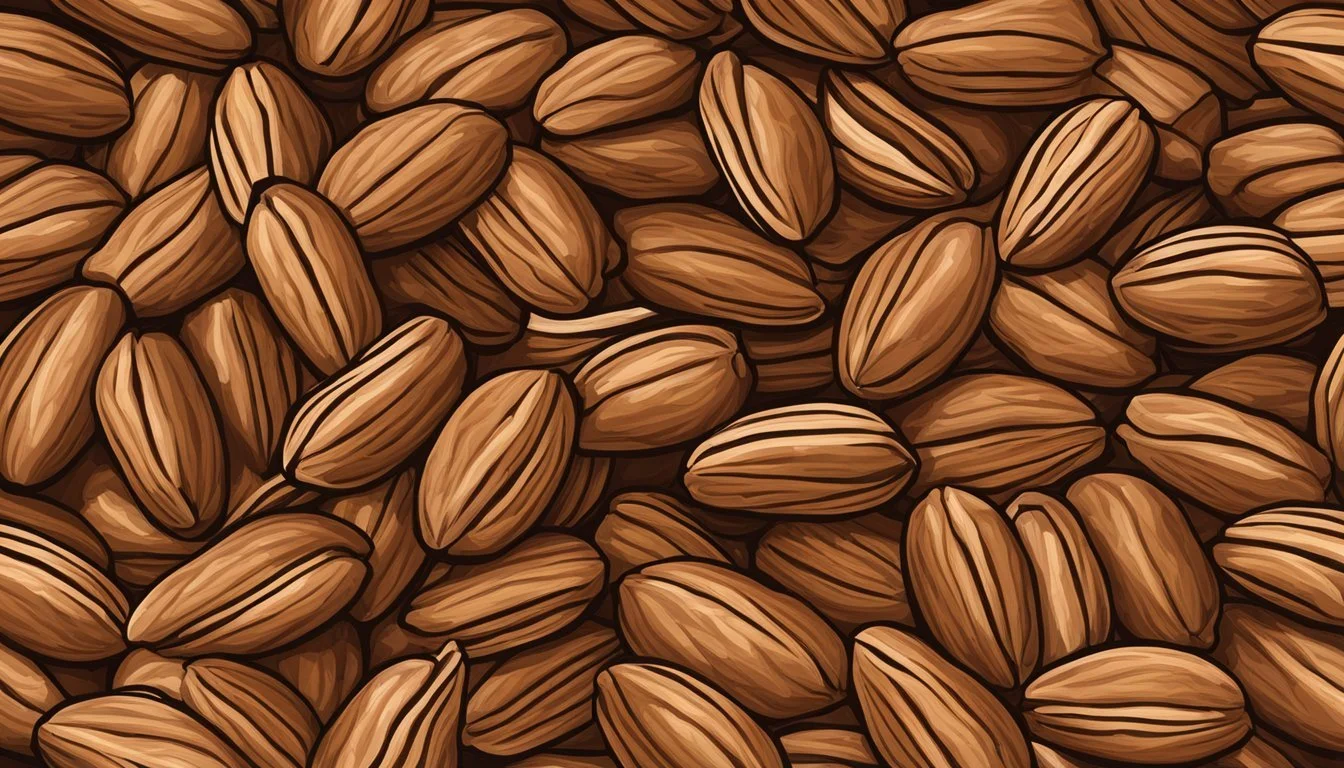How Many Cups in a Pound of Pecans?
Precise Measurement Guide
When cooking or baking with pecans, it's essential to know how to accurately convert weight to volume measurements. Pecans, a favored ingredient in a variety of dishes, from the classic pecan pie to savory applications, are sold by weight but often used in recipes by volume. Understanding the conversion rate between cups and pounds can help avoid kitchen mishaps and ensure the success of a recipe.
A standard measure found across various sources indicates that one pound of shelled pecans roughly equates to 3.5 to 4 cups when dealing with pecan halves. However, when pecans are chopped, a pound may yield a slightly lesser volume of about 3.25 to 3.75 cups, since the smaller pieces can settle more densely in a measuring cup. These measurements serve as guidelines for cooks and bakers who need to substitute or adjust quantities in their recipes.
While the conversion between cups and pounds of pecans is not an exact science due to factors like the size of the nuts (What wine goes well with nuts?) and how tightly they're packed into the measuring cup, these estimations are reliable for most cooking applications. Recipes often call for pecans in various forms—whole, halved, or chopped—and each form can affect the total volume in a cup, thus impacting recipes where precision is paramount.
Measuring Pecans
When it comes to baking and cooking, it is vital to accurately measure pecans. Understanding how weight translates to volume can ensure recipes turn out as intended.
Weight to Volume Conversion
Weight to volume conversion for pecans is crucial for baking precision. Typically, one pound of shelled pecans equals about 4 cups. However, this can vary slightly depending on factors such as pecan size and how tightly they're packed in the measuring cup. Using a kitchen scale is recommended for exact measurements, especially when dealing with dry ingredients like pecans.
1 lb shelled pecans = ~4 cups pecan halves
Weight Volume (Cups) Type of Pecans 1 pound 4 cups Pecan Halves 1 pound 3.75 cups Chopped Pecans
This table demonstrates that volume can vary with the form of pecan used—halves or chopped. For more granular recipes, it's important to adhere to these conversions.
Cups to Pounds Overview
When converting cups to pounds, the process generally involves using a standard cup measurement, though this lacks the precision of weight-based measurements. For pecans, a general guide is that 3 to 4 cups of shelled pecans will weigh approximately one pound. However, since volumes can be inconsistent, weight should be considered more reliable than cup measurements, particularly for baking.
4 cups pecan halves ≈ 1 lb
3.75 cups chopped pecans ≈ 1 lb
Cups (Volume) Weight (Pounds) Type of Pecans 4 cups 1 pound Pecan Halves 3.75 cups 1 pound Chopped Pecans
The reader should note that density and how the pecans are packed into the measuring cup can affect the volume, and thereby alter the conversion slightly. A kitchen scale remains the best way to ensure one's measurements are accurate.
Pecan Types and Forms
Pecans come in various forms and varieties, each with a distinct size and flavor profile. They are generally available shelled or unshelled, and within these two categories, there are further distinctions.
Shelled pecans: These pecans have had their hard outer shells removed. They are often found as pecan halves, which are ideal for recipes requiring large, presentable pieces, or as chopped pecans, which are pecan halves that have been cut into smaller pieces.
Unshelled pecans: These still have their hard, woody shell intact and must be cracked open to retrieve the nut inside.
When measuring pecans, the form matters:
Pecan halves are less dense and can provide a lower yield per pound when compared to chopped pecans.
Chopped pecans, being smaller pieces, tend to fill measuring cups more tightly, which can lead to a higher cup count per pound.
The size of the pecans is another important factor that can affect the measurement. Larger nuts will occupy more space, while smaller pieces can fit more densely into a cup.
In terms of variety, pecans differ mostly in flavor and shell thickness. Some varieties, like Desirable pecans, are noted for their softer shells, making them easier to crack. These can be significantly larger and are sometimes referred to as "mammoth" pecans. Other varieties, such as Schley pecans, offer an intense flavor and are a favorite choice for many culinary applications.
When processing fresh pecans, whether shelling them or chopping them, individuals should take into account that one pound of shelled pecans roughly translates to 3.5 to 4 cups, while a pound of chopped pecans provides about 3.25 to 3.5 cups. This conversion can be influenced by how tightly the pecan pieces are packed into a measuring cup.
Baking With Pecans
When incorporating pecans into baking, understanding the quantity required for a recipe is crucial. Typically, one pound of pecans equals approximately four cups. Pecans add a rich, buttery flavor and a crunchy texture to a variety of desserts. They are particularly prominent in traditional Southern baking, where a classic pecan pie—a delightful dessert with a burst of nutty goodness enveloped in a sweet filling—is a staple.
Pecans also contribute nutritional value to baked goods. They contain fiber and healthy fats, making them a nutritious addition to recipes. However, it is important to balance the inherent fat and calories in pecans with the other ingredients, particularly when aiming for a lighter dessert.
Using pecans in baking does more than just impart flavor; it can also affect the structure of the completed dish. When adding pecans to cake or bread recipes, one common technique is to toss them in flour before mixing them into the batter. This helps distribute the pecans evenly and prevents them from sinking to the bottom of the pan during the baking process.
Measurement Conversion 1 pound of pecans = 4 cups 1 cup of pecan halves = 3/4 cup chopped pecans
In recipes where texture is key, such as butter pecan pound cake, the pecans are often toasted beforehand to heighten their flavor and crunch. Toasting pecans in melted butter not only enhances their taste but also adds richness to the baked good.
Bakers should sift their flour and accurately measure sugar to ensure their recipe turns out correctly. While preparing pecan-infused desserts like a butter pecan pound cake, ingredients are blended to create a light and fluffy texture before the pecans are gently stirred in to maintain the batter's consistency.
Remember, while walnuts can sometimes be substituted for pecans, they offer a different flavor profile. Adjustments may need to be made to the recipe to retain the intended taste and texture of the dessert.
Nutritional Value of Pecans
Pecans are a nutrient-dense nut that offers several health benefits due to their rich nutrient profile. They are high in calories, with approximately 196 calories in a 1-ounce serving, which equates to about 19 pecan halves. However, the same serving size contains essential nutrients that contribute to a heart-healthy diet.
Fiber: A serving of pecans provides about 2.7 grams of dietary fiber, contributing to the daily fiber intake necessary for digestive health.
Fats: Pecans are high in healthy fats, predominantly mono- and polyunsaturated fats, which are beneficial for cardiovascular health. A 1-ounce serving contains around 20 grams of total fat, with a minimal presence of saturated fat (approximately 1.75 grams).
Proteins: With about 2.6 grams of protein per ounce, pecans offer a boost of this vital macronutrient that supports muscle repair and growth.
Vitamins and Minerals: These nuts come packed with vitamins and minerals. Noteworthy amounts include:
Vitamin A
Vitamin E
Folate
Calcium
Magnesium: An essential mineral for over 300 biochemical reactions in the body.
Potassium
Zinc: Important for immune function and enzyme reactions.
Pecans are naturally cholesterol-free, making them a smart choice for those monitoring their cholesterol levels. They also contain antioxidants, which contribute to the body’s ability to ward off oxidative stress.
The combination of high-calorie content with a robust nutrient profile means pecans can be an energy-dense snack that also supports various aspects of health when consumed in moderation.
Culinary Uses of Pecans
Pecans are a versatile nut commonly used in cooking, providing a distinctive nutty flavor to a variety of recipes. Their buttery and somewhat sweet taste complements both sweet and savory dishes, making them a favored ingredient in many kitchens.
One of the iconic uses of pecans is in desserts, particularly in classic pecan pie, where they serve as the star ingredient. Pecans also add texture and flavor to other sweet treats like brownies, cookies, and cakes. A Southern Pecan Pound Cake, for instance, highlights pecans both in and on the cake, delivering a satisfying crunch with every bite.
Beyond sweets, pecans are a flavorful addition to salads, as they provide contrast in texture and taste. When toasted, the intensified nutty flavor of pecans enriches the profile of fresh greens and vinaigrettes.
Savory dishes also benefit from the addition of pecans. They can be incorporated into the stuffing for meats, sprinkled atop casseroles, or even ground into coatings for fish or chicken, offering a pleasant, nut-infused crust.
Pecan oil, extracted from the nuts, is another culinary product valued for its light, buttery flavor, suitable for dressings and cooking. It's a healthier cooking oil alternative, with a high smoke point that makes it ideal for sautéing and frying.
For home cooks looking to expand their repertoire, a cookbook dedicated to cooking with pecans would feature a variety of recipes showcasing this nut in different forms, from whole or chopped, to blended into a paste for sauces or spreads.
By integrating pecans into meals, chefs and cooks at home can achieve a balance between depth of flavor and satisfying texture, enhancing the overall culinary experience.
Purchasing and Storing Pecans
When purchasing pecans, consumers typically find them available in various forms and quantities. Prices can differ based on whether the pecans are shelled or inshell, as well as the pecan variety. Retail stores often sell pecans in one-pound bags, a common size that can equate to approximately four cups of shelled nuts.
Purchasing in Bulk:
Price Advantage: Buying pecans in larger quantities may offer a price benefit per ounce.
Texture Check: Ensure the pecans have a firm texture and aren't soft or rubbery.
Storing Pecans: Consumers should prioritize proper storage to maintain the quality and extend the shelf-life of their pecans. Pecans possess oils that can turn rancid if exposed to warm temperatures for extended periods.
Refrigerator: Ideal for short-term storage, preserving texture and preventing pecans from becoming rancid.
Freezer: Pecans stored in a freezer can last up to one year. Use airtight bags to prevent moisture and odor absorption.
Raw pecans: Store in sealed containers to retain freshness and natural taste.
Chopped/Roasted pecans: Can be frozen to preserve enhanced flavors.
Storing Guidelines:
Storage Method Condition Shelf-Life Refrigerator Airtight container Up to 6 months Freezer Sealed bags Up to 1 year
Consumers should keep pecans away from strong odors and moisture. It's important to note that the texture and oil content can be affected if pecans are not stored correctly. Careful storage ensures pecans stay fresh, tasty, and ready for use in cooking and snacking.
Substituting Pecans in Recipes
When cooking or baking, it may be necessary to find a substitute for pecans due to allergies, preferences, or availability. There are several nuts that can be used as alternatives, keeping in mind both taste and texture variations.
Almonds, for instance, offer a firmer texture and a more neutral flavor. They can replace pecans on a one-to-one basis in most recipes; however, they lack the distinct richness of pecans. Whereas walnuts are closer in taste to pecans, with a slightly bitter profile, making them an almost seamless substitution in terms of flavor.
Pecan Substitute Taste Comparison Texture Measurement Almonds Neutral Firmer 1 cup Walnuts Slightly bitter Similar 1 cup
For recipes that require the creamy consistency of pecans, such as in sauces or spreads, nut butters can be a viable option. Peanut butter delivers a different but pleasant taste and is particularly useful when pecan nuts are meant to be a primary ingredient contributing to a creamy texture.
When using any substitution, chefs should consider how the alternate nut's flavor profile will interact with other ingredients. Texture can also be a determining factor; for instance, a switch from pecans to almonds may affect the mouthfeel of the finished dish. It is important to keep these considerations in mind to ensure the success of the recipe.
Health Benefits of Pecans
Pecans are a heart-healthy nut endorsed by the American Heart Association, primarily due to their beneficial composition of fats and nutrients. These nuts are rich in healthy fats, specifically monounsaturated and polyunsaturated fats, which can aid in maintaining balanced cholesterol levels.
The nuts are also a good source of Vitamin E, an antioxidant that supports heart health and contributes to the protection of cells from damage. This aligns them with foods that contribute to overall cardiovascular well-being. Pecans are inherently low in sodium, making them an excellent choice for a heart-friendly diet.
In terms of fiber, pecans contribute to a feeling of fullness and support digestive health, with research suggesting that they may help lower the risk of certain chronic diseases.
Here is a quick overview of the main health benefits:
Nutrient Benefit Healthy Fats Supports heart health, reduces cholesterol Vitamin E Antioxidant protecting against cellular damage Fiber Aids in digestion, promotes satiety Low Sodium Reduces blood pressure risk
When included as part of a balanced diet, pecans provide essential nutrients while contributing to an overall healthy nut consumption pattern. Their rich nutrient profile complements a strategy aimed at reducing the risk of heart disease and promoting general health.
Pecan Farming and Varieties
Pecan farming is a significant agricultural activity in the United States, particularly in states like Georgia and Texas, renowned for their production of this prized tree nut. Each farm may cultivate a range of pecan varieties, each with distinct traits such as flavor, shell thickness, and nut size, catering to varying market demands.
Pecan trees, being native to North America, favor the warm climates of the Southern states. Georgia, often referred to as the "Pecan Capital," boasts extensive orchards, a testament to the tree nut’s cultural and economic importance. Texas also plays a crucial role in pecan cultivation, providing a sizable percentage of the national yield.
The diversity of pecan varieties allows farmers to select trees best suited to their regional climate and soil conditions. Common varieties include:
Cheyenne: Noted for its thin shell and light golden meat.
Choctaw: Recognized by its large nuts and high yield.
Desirable: Known for its medium-large size and soft shell.
Cultivation practices differ across farms, but all aim to optimize the health and productivity of the trees. Pecan trees require several years to mature and begin bearing fruit, making pecan farming a long-term investment. Farmers must manage pests, diseases, and ensure proper irrigation and nutrient application to foster robust tree growth and nut development.
In summary, pecan farming entails careful selection and cultivation of tree nut varieties to produce quality pecans that satisfy consumer preferences and support a thriving agricultural sector in states like Georgia and Texas.










